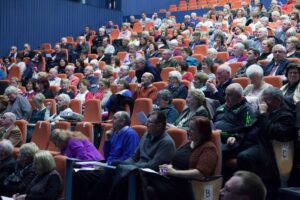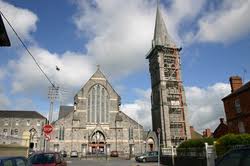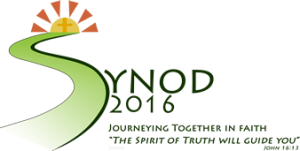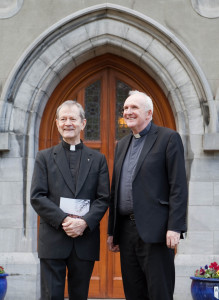It had always been the intention to hold the next public meeting of ACI Mid-West as a follow on to the ACI Umbrella Group’s launch of Starting a National Conversation which took place in Dublin in early October. What we couldn’t have foreseen was the issuing at much the same time here in the Limerick Diocese of a Pastoral Letter by Bishop Brendan Leahy in which he took the initiative of calling together a Diocesan Synod, the first of its kind to be held in Ireland since the 1950s. It seemed that the National Conversation was transmogrifying into a local one at very great speed indeed.
In his pastoral letter Bishop Leahy had likened the proposed synod (the word ‘synod’ is itself comprised of 2 Greek works meaning ‘journeying together’) to the journey undertaken by the many people today who opt to go on the popular Camino de Santiago de Compostela and who in doing so “get time to think; they meet interesting people along the way; they strike up conversations with fellow pilgrims that leave a deep impression; they discover a new direction in their life; they work out some problem that might be hurting them; they come back with a new vision.” This search for a new vision being also reflected in the title of the pastoral letter: ‘Together in Mission – A Time to Begin Again’.
And so it was that when we came to hold our meeting towards the end of October it would have a twofold purpose, now with the additional need to discuss this historic happening in our Diocese and our response to it. We had many questions: How exactly would the synod work? What would it mean for the diocese? Who would be involved? What would be expected of them? And what of structure, agenda, timetable, outcomes… etc.
Fr. Éamonn Fitzgibbon, Episcopal Vicar, had been appointed Synod Director and he very kindly and readily agreed to address our meeting.
A large attendance gathered with interest to hear his presentation on the night of October 30th in the Monastery at Mt. St. Alphonsus on ‘The Limerick Synod and the Role of the Laity’. He began by giving some background on the nature, history and significance of synod in the Church, then going on to outline an overview of the process and schedule plan for the Limerick Synod, from the issuing of the pastoral letter convoking the synod through the preparatory stages, then the official launch in St. John’s Cathedral in December, to be followed by the further various day-long events proposed for 2015, talks, opportunities for catechesis, discussion, listening, sharing, feed-back of opinions etc., culminating in the actual 3-day synod event itself scheduled from April 8-10 in 2016.
Synod participants would include members of the preparatory commission (the steering group) which had already been established, all diocesan clergy, along with observers from other faiths. And the process of identifying lay delegates to the synod was actively underway, both within all parishes throughout the Diocese, but crucially from across a wide spectrum of non-parish groups and communities as well, with the objective as Fr. Éamonn explained, of ensuring as wide a representation and inclusion of all aspects of life and activity in the Diocese as possible. And in that context, he extended a direct invitation to ACI to provide delegate representation to the synod also.
The conclusion of his formal talk and powerpoint presentation was followed by a lively and thought-provoking Q. & A. session.
So within a very short space of time, we had moved from wishing to generate the conversation, as with the launch in Dublin, to the opportunity to actively engage in it as a diocese in Limerick. ACI Mid-West was keen to respond to the invitation to journey together in diocesan synod and the opportunity, as Bishop Brendan had put it, “to ask ourselves: what Church do we want to be as we face the challenges ahead of us? What face of the Church do we want to present to society today in order to serve it with humility? How best can we be salt, light and leaven for the world around us?” Indeed our meeting in March 2013 had focussed on specific questions of that nature, such as ‘What model of church would you like to see in 5/10 years from now? and ‘How will our church get from where it is to-day to where you would like it to be in 5/10 years from now?’ and our subsequent work on these questions had gone some way towards formulating a vision of church into the future which would feed very naturally into the process of pursuing a common vision in the diocese of Limerick.
Applications forms were filled and submitted. There were several of our members willing to give the time and commitment to the process on behalf of ACI, people who also because of their many community and/or parish involvements and interests were potentially eligible to represent any one of several other groupings participating in the synod. When the letters of selection were issued, it was found that two had been invited as delegates to represent ACI and other members would be involved as representatives of other groupings.
The first Preparatory Gathering of the Synod was held on Saturday November 15th. In excess of 300 delegates registered on the day, with this number likely to rise to an anticipated total of 400 in the weeks ahead.

Limerick gathering Nov 15 – in the Lime Tree Theatre, Mary Immaculate College – to hear Fr Philibert and Bishop Leahy explain the upcoming synod
There was a definite buzz in the air as people met and mingled before gathering in to the auditorium for the Opening Prayer celebrated in both word and music, after which Bishop Leahy gave his Opening Address.
We were introduced to the Limerick Synod Website and to the symbolism of the Limerick Synod Logo by their creators, Chris Culhane and Enda Griffin. You can see their fine work first-hand at www.synod2016.com. It will be very useful to log on to this address for all who wish to follow developments in the months ahead.
There was a further information session for everyone, then a choice of 6 workshops in the afternoon, on topics such as ‘The Synod and Parish Life’, ‘Synodality and Vatican 11’, ‘The Synod as Pilgrimage in Faith’ etc.
And in between times, over coffee break, an organised opportunity for each group to meet up briefly as a group, a chance to identify and connect with their fellow group reps if they had not already done so.
The main keynote address of the day was delivered by Fr. Paul Philibert, a member of the Dominican order, retired professor of pastoral theology from the U.S., and author of ‘The Priesthood of the Faithful: Key to a Living Church’. His address was both motivational and challenging. And far too complex to encompass here, other than to refer to a few brief points.
His opening sentence was a particularly striking statement of the potential for renewal inherent in synod: ‘Convening a diocesan synod’ he said, ‘is a way of spiritually re-founding a diocese.’
In expressing how the synod process would form a bridge between the past and the future, Fr. Philibert said that it would have the effect ‘of making the church’s tradition contemporary with current needs and present culture.’ It would help us to ‘name and aim’ i.e. ‘to name the unusable past and aim for the necessary future.’
The synod would, he said, be a meeting of peers, ‘of all of us baptized into Christ, anointed by the Spirit, and called to the work of building up the church. There is only one “dwelling place for God” built of those who dwell in Christ. And all those who dwell there have a voice in the synod, something to say about what the Spirit is urging in the hearts of the faithful.’
Bishop Leahy had made a similar point in his Pastoral Letter: “For the Synod to be the journey it needs to be, we must all travel together. Everyone has an opinion worth listening to and we must listen in order to learn.”
Indeed a similar sentiment is to be found in ACI’s Statement of Objectives which reads “that the Spirit speaks through the voices of all the baptised (clerical, religious and lay); and the consequent right of all the baptised to have their voices heard in the formation of church teaching and to participate fully in the life of the Church, including decision-making at parish, diocesan, national and international levels.”
Fr. Philibert went on to speak of the need to ‘recalibrate’ our understanding of what church is and our role within it, and contrasted 2 models of church. The first, pre-Vatican II, he called the ‘church of Christendom’, which he characterised as a church of rituals, a clerical church which fostered ‘client congregations’ in which the faithful are seen as ‘passively dependent clients of ordained leaders.’ Now, post-Vatican II, we were moving to another model of church which he called the ‘church of charismatic communion’ and characterised it as a church of ‘mutually ministering congregations’, with all of the baptised actively involved in the Church’s apostolic mission. We were moving ‘from clerical control to Spirit-led initiatives’, the actively apostolic church emerging from an essential synergy, a ‘convergence of our Yes and the Spirit’s action’.
Fr. Philibert’s address ended as strikingly as it had begun, first by posing, and then by proposing an answer to the question: ‘What will the synod mean for you? – The answer of course will be different in each case. But for everyone it will mean taking responsibility for the gifts that we have been given and bringing them to life. It will mean becoming Christian in the world for the sake of the world. It will mean learning how to become a sacrament of divine love.”
These are indeed stimulating times in Limerick.
Áinéad Ní Mhuirthile




Áinéad, don’t you think the last two sentences of the second last paragraph above, ‘Now post Vatican 11, we were moving……convergence of our Yes’ and the Spirit’s action’ are calling for a fleshing out’.
I’m all geared up and ready to set out on an on-line Camino de Compostela, to strike up and develop ACI October Conversation with other pilgrims. I’m looking for fellow pilgrims with whom to converse on e.g. What will the celebration of Mass look like in our transformed Church? Would we consider finding ways modelling what we envisage? Any takers?
Yes indeed, these are indeed stimulating times in Limerick’, and thank you for bringing us into the circle.
Teresa
Thanks for your comments, Teresa. There was much in Fr. Philibert’s address for everyone to ponder. The point you mention in particular is a very important point and refers essentially to the action of the Holy Spirit and our receptivity to it. And that’s something that will be key throughout the whole synod process and will surely be central to the official opening ceremony and commissioning of delegates which takes in St. John’s Cathedral later today.